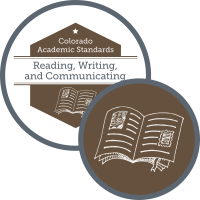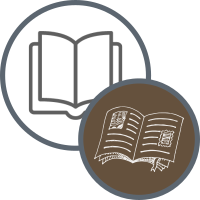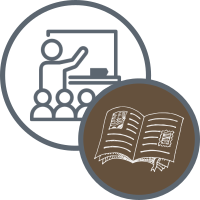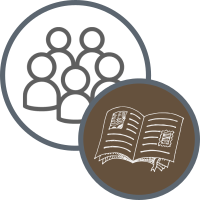You are here
Reading, Writing, and Communicating
CDE Position Statement: RWC Standards & English Language Learners
The Colorado Academic Standards in Reading, Writing, and Communicating were written for all students using the content, concepts, skills, and language conventions and structures found within the English language. This does not mean students must be native English speakers, nor fluent English proficient, but by utilizing the Colorado English Language Proficiency standards (Office of Culturally and Linguistically Diverse Education) in tandem with the Colorado Academic Standards, qualified and well prepared educators can ensure that all English learners receive appropriate support to ensure all students successfully meet the expectations in the standards.

Academic Standards
The reading, writing, and communicating standards invite students to use texts to better understand others' experiences in the world and to command language in order to articulate their own perspective on the human experience. The standards intentionally reflect the read-write connection and the relationship between critically consuming text to build knowledge and producing texts to convey knowledge.

Curriculum Support
Article IX, Section 16 of Colorado's constitution states, "Neither the general assembly nor the state board of education shall have power to prescribe textbooks to be used in the public schools." However, CDE can still serve as an advisor to help districts and schools adopt, adapt, develop, or use the materials of their choice.

Instructional Support
Instructional support is grounded in CDE's shared approach to Best, First Instruction as well as practices and strategies supported by professional organizations and scholars at the leading edge of reading, writing, and communicating education.

Community
There are many opportunities to connect and grow as a professional educator with the larger reading, writing, and communicating education community, including mail lists, professional organizations, and events.
- National Council of Teachers of English (NCTE): NCTE amplifies the voice of educators through personal connection, collaboration, and a shared mission to improve the teaching and learning of English and language arts at all levels.
- Conference on English Leadership (CEL): The Conference on English Leadership offers a collaborative, dynamic, discussion-based forum for literacy leaders to explore current and emerging issues.
- Colorado Language Arts Society (CLAS): The Colorado Language Arts Society is the state affiliate of the National Council of Teachers of English (NCTE), a professional association of educators in English studies, literacy, and language arts.
- Colorado Counsel International Reading Association (CCIRA): CCIRA collaboratively encourages, supports, and advances literacy through researched-based instructional practices to increase literacy access to all.
- Read. Learn. Lead. Campaign: Of the widely accepted essentials children need to thrive, reading is often the one we forget to provide. Therefore, CDE has launched a public information campaign to encourage and empower parents to make reading part of their daily routine with their children.
Important News, Announcements, and Updates
New Materials Resource Bank for Grades 4-12
The educational materials referenced have undergone a rigorous evaluation process through EdReports and have been selected as Colorado Department of Education (CDE) recommended resources based on meeting all gateway criteria. These materials have met stringent quality standards.
https://www.cde.state.co.us/coreadingwriting/materials
For More Information, Contact
Mykel Knight
Office of Standards and Instructional Support
Phone: 720-930-1298
Email: knight_m@cde.state.co.us
New Instructional Program Review Rubrics for Grades 4-12
CDE, in partnership and collaboration with WestEd, has created instructional program rubrics for Colorado school districts to use as a resource when reviewing programs for grades four through 12. Similar to the instructional program review rubrics for K-3, the rubrics for 4-12 have two phases: Phase I demonstrates alignment between K-3 and 4-12, utilizing existing language from the K-3 rubric to delineate similarities, differences, and the vertical changes and complexities students in K-3 to 4-12.
Phase I Categorical Buckets
- Existing Phase I Rubric for K-3
- Phase Rubric for 4-12
- Explanation of Changes
Phase II of the 4-12 rubrics focus on and are divided into the categorical buckets listed below. They have been selected and designed to intentionally reflect all components of literacy (i.e., reading, writing, speaking, and listening), elevating conversations, considerations, and analysis for districts and schools prior to and during the curriculum adoption process. Each indicator is grounded by a question for leaders and educators to not only ponder in its use of the rubrics for instructional program and/or curriculum selection, but also in instructional practices both leaders and educators desire to provide their students. The sections within the categorical buckets of the rubric are aligned to the Colorado Academic Standards for Reading, Writing, and Communicating and highlight the foundational principles of disciplinary literacy while supporting literacy proficiency for students who remain on READ plans beyond third grade.
- Reading
- Writing
- Fluency, Vocabulary, and Word Analysis
- Oral Expression and Comprehension
- Research and Analysis
The Instructional Program Rubrics for Grades 4-12 are grounded in research and evidence-based practices that can be found on the 4-12 Literacy Instructional Rubrics Reference List. The reference list is organized into two main sections: cross-category references and rubric-specific references. The cross-category references address skills and knowledge that cross all rubric categories. The rubric-specific references are subdivided by rubric category. However, some references appear in multiple rubric categories; these references have been indicated with an asterisk. Please note that while this list has been divided into categories, many of our references could inform multiple aspects of literacy instruction and apply to other rubric categories even if not explicitly marked.
For More Information, Contact
Mykel Knight
Office of Standards and Instructional Support
Phone: 720-930-1298
Email: knight_m@cde.state.co.us
Monthly Literacy Conversations
The Reading, Writing, and Communicating Content Specialist in the Office of Standards and Instructional Support will host two monthly virtual conversations. The first monthly conversation will be a deep dive into a different aspect of the Colorado Framework for Writing Instruction and the process districts and schools can take to create their own writing framework through research and evidence-based practices. Conversations on the framework will examine beliefs around writing, in general, and teaching writing, in particular. Participants will create a framework within their local context through research and evidence-based practices that speak to the write-read connection, the systems and structures that should be in place to effectively impact both student and teacher outcomes in the implementation of high-quality writing instruction.
- Writing READ plans for students in grades 4-12
- Goal setting and progress monitoring in grades 4-12.
- Types of effective assessments and data cycles in grades 4-12.
- Collecting a body of evidence to exit a student from a READ plan in grades 4-12.
To register for each conversation, please go to Monthly Literacy Conversations website.
For More Information, Contact
Mykel Knight
Office of Standards and Instructional Support
Phone: 720-930-1298
Email: knight_m@cde.state.co.us
The Science of Reading Literacy Series
The Elementary Literacy and School Readiness (ELSR) office at CDE is developing a series of turnkey professional development options for districts to use to support implementation of evidence-based practices in the Science of Reading. The Science of Reading Literacy Series will begin with a focus on six instructional routines that address each of the components of literacy and oral language. Educators and leaders can access the series by clicking on this link.
CDE Release of the Colorado Framework for Writing Instruction
The Colorado Framework for Writing Instruction is intended to support district- and school-level leaders in facilitating conversations with their literacy leaders, instructional coaches, and teachers to develop a research-based framework toward the teaching of writing. The framework begins with a lean toward examining the beliefs around writing, in general, and teaching writing, in particular. Because of the complexity and the unique demands inherent in the teaching of writing, it is important for district and school leadership to bring to the surface the beliefs that teachers hold. This framework connects these more abstract beliefs to a research base. From there, it offers the elements of a “desired state” of teaching writing: the observable teacher behaviors that demonstrate effective writing instruction and the student behaviors that follow those actions. Finally, the framework connects the instructional practices to the professional development necessary to move districts and schools toward their vision. The framework can be found at https://www.cde.state.co.us/standardsandinstruction/creatingawritingframework.
For More Information, Contact
Mykel Knight
Office of Standards and Instructional Support
Phone: 720-930-1298
Email: knight_m@cde.state.co.us
CDE Release of Guidance for READ Plans for Students in Grades 4-12
The purpose of the Colorado READ Act is to ensure that every student in Colorado can read at grade level by the time they exit the third grade. What happens if a student enters into the fourth grade and cannot read grade-level texts with ease, demonstrate understanding of grade-level material, and/or think critically as asked in the Colorado Academic Standards for Reading, Writing, and Communicating? What if the same student has been identified as having a Significant Reading Deficiency (SRD)?
CDE has comprised guidance for supporting students who remain on READ plans in grades 4 thru 12. The guidance is intended to provide all Colorado districts with research, resources, and training opportunities to support students who remain on READ plans beyond the third grade. The guidance and other information can be found at https://www.cde.state.co.us/standardsandinstruction/4plusreadplans.
For More Information, Contact
Mykel Knight
Office of Standards and Instructional Support
Phone: 720-930-1298
Email: knight_m@cde.state.co.us
For further assistance, please contact:
Mykel Knight
RWC Content Specialist
knight_m@cde.state.co.us



Connect With Us





